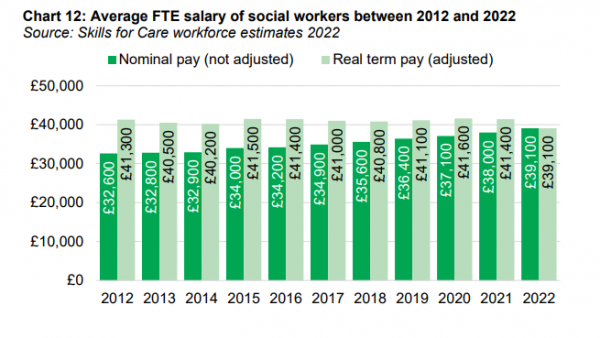
Would you support social workers joining public sector professionals in striking over pay this year?
- Yes (83%, 2,146 Votes)
- No (13%, 328 Votes)
- Don't know (4%, 112 Votes)
Total Voters: 2,586
Average pay for council adults’ social workers in England has fallen in real terms over the past decade, annual workforce data has shown.
Practitioners earned £39,100 on average as of September 2022, an increase in cash terms of £1,100 (2.9%) on the year before, showed Skills for Care’s annual report on social work in council adults’ services.
However, because of the high rates of inflation in 2022, this amounted to a real-terms fall of 5.6% since 2021, while the data also showed that average pay had fallen by 5.5% since 2012 once rising prices had been accounted for.
The figures were recorded before the £1,925 pay rise agreed for most council staff in 2022-23 took effect. However, even if this were added on, real-terms pay would still be about 1% lower than in 2021 or 2012.

Source: Skills for Care, 2023
The pay figures come against the backdrop of mounting workforce pressures in relation to social work adults’ services, with vacancies rising and turnover and days lost to sickness reaching record levels. Skills for Care’s data showed that:
- The vacancy rate had risen to 11.6%, up from 9.5% in September 2021 and 7.5% in 2020.
- Turnover in the year to September 2022 had risen to 17.1%, as against 15% in 2020-21 and 13.6% in 2019-20.
- Days lost to sickness averaged 12.1 per social worker in 2021-22, up from 10.3 the year before.
- The number of social workers employed by councils was stable year on year, at 17,300, as was the number of full-time equivalent posts (15,600).
The workforce challenges come amid severe strain on adult social care services, including high levels of delayed discharges from hospitals and long waiting lists for assessments and care packages.
Big regional differences in vacancies, sickness and turnover
The Skills for Care figure revealed significant regional variations in vacancy, sickness and turnover:
- Vacancy rates were below 7% in Yorkshire and Humber and the West Midlands, and above 12% in the East Midlands and London.
- The average number of sickness days per employee was lower than eight in London and the South East, and above 12 in the West Midlands, North East and North West.
- Turnover rates were below 13% in the East Midlands, North East and North West and above 18% in the Eastern region and London.
As in 2021, 82% of the workforce were women and 29% were from a black, Asian or ethnic minority group.
‘Lack of support from central government clearly evident’
The British Association of Social Workers England said the findings indicated “a further deterioration in relation to the situation with the wellbeing, recruitment, retention of the adult social work workforce”.
“We are seeing the largest number of vacancies and challenges to recruit and retain adult social workers that we have ever seen coupled with waiting lists and the increased demand for adult social care,” it added.
“The situation is untenable and further exacerbated by the lack of recognition and reward through pay which is now lower in real terms than in 2012. The lack of support for adult social workers from central government is clearly evident.
“We are campaigning and lobbying the government to ensure pay reflects increases in line with inflation and the cost of living. We call on the government to publish a nationwide recruitment and retention strategy and to invest in adult social work now.”
Funding ‘will address workforce pressures’
In response to the figures, a Department of Health and Social Care (DHSC) spokesperson said: “We want to recruit and retain social workers with the right skills, knowledge, and values to support vulnerable adults, children, and families.
“Government is investing up to £7.5bn in social care over the next two years – the biggest funding increase in history – which will help address workforce pressures and support a more joined-up and person-focused health and care system.”
The £7.5bn figure has been criticised by some in social care on the grounds that £3.2bn was recycled from the delay to the social care charging reforms and is also to be split with children’s services, while £1.6bn is reliant on how much authorities can raise through council tax.





 Family help: one local authority’s experience of the model
Family help: one local authority’s experience of the model  ‘I spent the first three months listening’: how supportive leadership can transform children’s services
‘I spent the first three months listening’: how supportive leadership can transform children’s services  How senior leaders in one authority maintain a culture of excellence
How senior leaders in one authority maintain a culture of excellence  How staff support ensures fantastic outcomes for children and families
How staff support ensures fantastic outcomes for children and families  Workforce Insights – showcasing a selection of the sector’s top recruiters
Workforce Insights – showcasing a selection of the sector’s top recruiters 

 Facebook
Facebook X
X LinkedIn
LinkedIn Instagram
Instagram
Not sure where they got the average social worker wage been £39,000 – I wish. Qualified for over 10 years now not close to that figure
I left social work after 14 years. Lack of staff, support, morale and continuously rising high caseloads with added demand had finally worn me down. This was a career I enjoyed but it got to a point where giving my all was no longer enough. Good luck to all the wonderful people continuing on. As for the £39k – where is that….I might consider returning if that were true!
I still work as a social worker in adult services in the North West of England. Caseloads are umanageable, and it’s really difficult to get funding approved for packages of care. Often support plans are sent back or delayed and anyone receiving 1-1 has to be reviewed 3 monthly, the paperwork is too much. Not sure why I carry on, but try and think about the people we serve and do my best.
Unfortunately, Social Workers are not told of Unions and their importance from the beginning of their studies. Sadly, the collateral damage that Mrs Thatcher did to the Unions from 1979 onwards remains embedded. Social Workers can have difficulties understanding that they will most likely experience work difficulties joining the profession and are wilfully ignorant entering the workforce, only realizing often when it’s too late that being in a union can indeed be supportive – frequently when one’s colleagues have gone missing in action.
In regard to the pay issue, individual social workers see paying a monthly subscription as too costly and they naively believe that their employers will ‘do good by them’. This individual short-term thinking has led somewhat to where we are today as it’s not just about pay, but about workers’ terms and conditions as unfortunately we do have to work with unscrupulous individuals working for our employers.
Honestly, I am embarrassed by the profession for accepting the previous pay deal seeing how bad things have been and how they are. I am embarrassed often by colleagues and the profession generally for their wilful ignorance by not being able to have a say about their job and the such issues by not importantly voting or being even basically a union member.
It is a very sorry state of affairs for Social Work within the UK that we have such professional insecurity and are powerless ourselves when we’re supposed to be a profession that upholds social justice and promotes empowerment with those we work with. Sadly having a voice and using it within the health, social care, and third-sector workplace can be identified as ‘not a good thing’ in the stark reality of working for a living.
I look on with mixed emotions presently and truly commend all the strikers especially the health sector for their strength of resolve upon this important matter
We are good at protecting and advocating for others but not ourselves as we are too tired.
I have seen an increase of social workers being disciplined on gross misconduct charges which appear to be often due to having a disagreement with their line manager. Many agency staff just get terminated and permanent staff put through due process of a disciplinary hearing.
For those who are not members of a Trade Union this is a difficult process. Employers do not always present all of the facts, workers are not always given the information they request for their defence and are often unrepresented.
You are allowed by law to have trade union representation or that of a colleague. If not a union member then all you have is a colleague who frequently will withdraw under the pressure of management.
I urge all workers both permanent or agency to join a union. Referrals to our registration process can lead to disbarment and representation from trained, skilled union officials is worth it’s weight in gold.